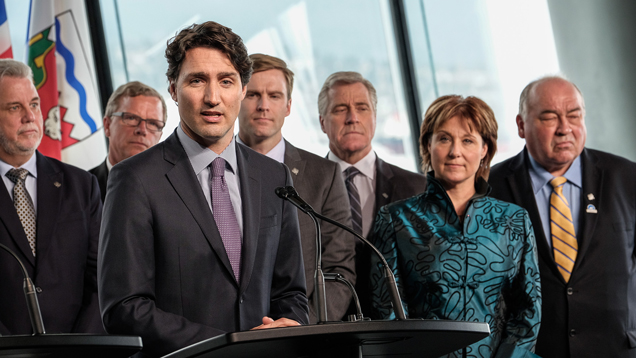Trudeau attempts to distance himself from Harper's isolationism
 CREDIT: "FIRST MINISTERS' MEETING" BY PROVINCE OF BRITISH COLUMBIA (CC BY-NC-ND 2.0)
CREDIT: "FIRST MINISTERS' MEETING" BY PROVINCE OF BRITISH COLUMBIA (CC BY-NC-ND 2.0)With Canada back in the running to get a seat on the UN Security Council, Trudeau has proven once again "Canada is back".
On March 16, Prime Minister Justin Trudeau announced that Canada will be running for a 2021 seat on the UN Security Council, which the country has not held since 2000. The Harper administration ran for a seat in 2010 but was denied. This announcement goes along with the new government's theme of distancing itself from the previous one, as well as party lines like “Canada is back” signaling a shift in tone and policy.
Fanshawe Political Science professor Matt Farrell believes that Trudeau has gone out of his way to engage the dichotomy, or big difference, between himself and Harper. He cited a large state dinner and the pageantry and celebrities that went along with it, which Harper would not have held. A number of liberals believed that the Harper government losing the UN seat signaled a shift in foreign policy, and are looking to get the country back on track.
“Trudeau is trying to send that signal to voters and countries around the world, that ‘look, while Canada may have been on an isolationist streak, now we're not. Now we're ready to play ball',” Farrell said.
He added that Harper being denied the Security Council seat may have been due to underlying issues like the UN's criticism of the Israeli government, while Harper supported them and was more critical of the Palestinian authority. What all of this comes down to is a shift in narrative while Trudeau tries to enforce the fact that Canada is doing things differently under his leadership, including engaging multilateral allies and running for a seat on the Security Council. The prime minister has also been vocal on global issues like climate change, and has attempted to talk Canada up as a country that wants to participate.
The only outlier is Trudeau's attempts to take Canada out of Iraq and Syria, but people have been re-deployed. Farrell anticipates that the prime minister will keep up with speaking on global issues and joining in where he can.
“We'll see Trudeau really sign Canada up for international initiatives. Canada's always had a reputation of being a serial international joiner because we're a small country and we can't do much on our own, so we sign up for these things� Whereas Stephen Harper kind of shifted away from that, I think we're going to see Trudeau continue to sell us as somebody that's a willing participant,” Farrell said.
He also feels that there are benefits to Trudeau's charismatic media presence, in that it could improve the global community's opinion of Canada as a whole, political rhetoric and photo opportunities aside. Whether it could spill over into diplomatic or economic benefits has yet to be seen.














